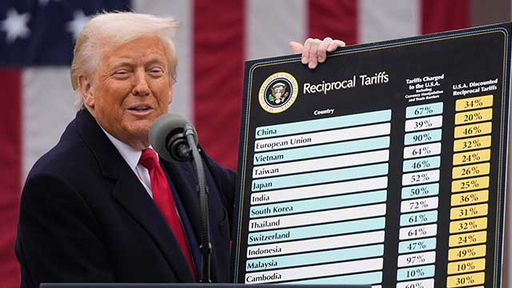


The U.S. administration under Donald Trump has temporarily exempted high tariffs on key electronic products, such as smartphones, laptops, and semiconductor equipment, providing a brief relief to global electronics companies, including Samsung Electronics and Apple. This decision is interpreted as an effort to consider the impact on domestic big tech companies, as well as to reduce the burden on consumers and related industries.
According to reports from Bloomberg and other media outlets on the 13th, the U.S. Customs and Border Protection (CBP) announced on the 11th (local time) through a notice on "Reciprocal Tariff Exemptions for Specific Goods" that approximately 20 items, including smartphones, laptops, hard disk drives, computer processors, memory chips, and semiconductor manufacturing equipment, will be exempt from reciprocal tariffs. This measure will be applied retroactively from 12:01 AM on the 5th of the month, and companies can receive refunds for tariffs already paid.
This move is expected to have a positive impact on the entire U.S. electronics industry. In particular, Samsung Electronics and Apple are considered major beneficiaries in the smartphone market. Apple sources 90% of its iPhone production from China, while Samsung Electronics produces about half of its smartphones in its Vietnam plant.
Earlier, the Trump administration had announced tariffs of up to 145% on Chinese products and 46% on Vietnamese products, meaning this new decision will relieve both companies from significant tariff burdens.
The semiconductor industry has also been somewhat relieved by this decision. The Trump administration included not only finished products like memory chips, DRAM modules, and solid-state drives (SSDs) but also semiconductor manufacturing equipment in the list of tariff-exempt items. This is a positive development for Samsung Electronics and SK hynix, which do not have memory production facilities in the U.S. In particular, semiconductor manufacturing equipment is crucial for future investments in U.S.-based semiconductor plants, and this move is seen as a response to the U.S. policy of attracting semiconductor plants to the country.
However, there is also a perspective that this announcement is only a temporary easing measure. President Trump has continuously stated his position that he can impose item-specific tariffs on critical technology products such as semiconductors under Section 232 of the Trade Expansion Act.
Section 232 of the Trade Expansion Act allows the U.S. president to impose tariffs or other measures to restrict imports of specific items deemed to threaten national security. The U.S. has already applied Section 232 to impose a 25% tariff on steel and automobiles.
Meanwhile, the Trump administration is expected to clarify its stance on semiconductor tariffs on the 14th (local time). Initially, a 25% tariff had been proposed, but given the burden on domestic big tech companies, there are discussions about the possibility of adjusting the tariff rate.
ChatGPT를 사용하여 번역한 기사입니다.


 Copyright ⓒ 메트로신문 & metroseoul.co.kr
Copyright ⓒ 메트로신문 & metroseoul.co.kr
Copyright ⓒ Metro. All rights reserved. (주)메트로미디어의 모든 기사 또는 컨텐츠에 대한 무단 전재ㆍ복사ㆍ배포를 금합니다.
주식회사 메트로미디어 · 서울특별시 종로구 자하문로17길 18 ㅣ Tel : 02. 721. 9800 / Fax : 02. 730. 2882
문의메일 : webmaster@metroseoul.co.kr ㅣ 대표이사 · 발행인 · 편집인 : 이장규 ㅣ 신문사업 등록번호 : 서울, 가00206
인터넷신문 등록번호 : 서울, 아02546 ㅣ 등록일 : 2013년 3월 20일 ㅣ 제호 : 메트로신문
사업자등록번호 : 242-88-00131 ISSN : 2635-9219 ㅣ 청소년 보호책임자 및 고충처리인 : 안대성